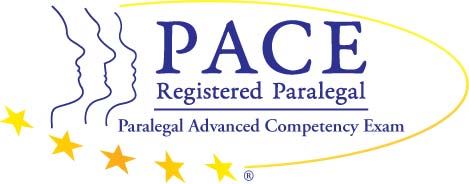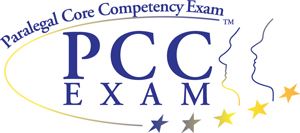PACE and PCCE Certifications
In 1992, the National Federation of Paralegal Associations ("NFPA") adopted a resolution establishing a position on regulation of the paralegal profession. In 1994, that position was modified to endorse the establishment of the Paralegal Advanced Competency Exam. ("PACE"). With the assistance of the Professional Exam Service, NFPA developed a computer generated two hundred question multiple choice exam designed to be taken within a four hour time period. Test question are based on federal law and address topics such as the administration and development of client legal matters, legal research, legal writing, office administration and ethics.
The purposes of PACE are to provide the groundwork for expanding paralegal roles and responsibilities, to provide the public and legal community with a mechanism to gauge the competency of the experienced paralegal; and to provide a standard for states considering regulation of experienced paralegals.
Any member interested in sitting for a PACE exam should contact the MPA Certification Ambassador.
Certification Ambassador |
Contact the Certification Co-Ambassadors at certification@mnparalegals.org if you have any questions.
Information from NFPA
PACE FAQsWhat is PACE? PACE stands for Paralegal Advanced Competency Exam. Professional Examination Service (PES) assisted in development of the test in which paralegals demonstrate an established level of knowledge, skills, and competency. What does RP mean? RP is the designation for the paralegal who has successfully passed the PACE and stands for Registered Paralegal. The designation has been registered with the U.S. Patent and Trademark Office. What are the requirements for taking PACE? Because this exam is for experienced paralegals, the requirements are greater and include both experience and education. These can be found in detail on the NFPA website at www.paralegals.org What is the best way to study for the test? The right answer to this: whatever is the best way for you. Some people study better in groups while others do well studying alone. Some prefer online review courses. Some prefer to use a combination of these methods…it is entirely up to you. Are there any special study materials? NFPA sells a PACE Study Manual online for $75 (plus S&H). This is a “must” for preparing for the exam. Be sure you have the latest edition. There is a bibliography in the PACE Study Manual. The resources listed in the bibliography should be reviewed. Some candidates like to gather additional materials such as flash cards, bar charts, and manuals containing Federal Rules. It is very important that you study the Blue Book for all references to citations. The Certification Ambassador can also provide you with a suggested list of additional study materials which he/she has obtained through the NFPA Coordinator for Study Materials who frequently updates the list of study materials. It is always a good idea to spend some time in the law library as well. How do I join a study group? MPA’s Certification Ambassadors will help interested persons form study groups. These groups meet on a schedule they set themselves at a mutually agreed location. Please contact the Certification Ambassadors for information regarding the current or next session. Who are MPA’s Certification Ambassadors? Kristy Geron, RP® and Tina Johnson, RP®, MnCP are the MPA Certification Ambassadors. You can contact them at certification@mnparalegals.org if you have any additional questions. How long does it take to study for the exam? That is entirely up to you, but most paralegals who work full time take four to six months to prepare. What is the online review course? This course is offered through the American Institute for Paralegal Studies (AIPS) and Paralegal Education Group (PEG). More information can be found on NFPA’s website (www.paralegals.org). Tell me about the PACE online practice test. The test is taken on the computer (as the real test will be) and consists of 100 questions. This one-time practice exam is an excellent tool in preparing for PACE. The program will advise you of your total score, the missed questions as well as the correct answer and reference materials for the questions you missed. The test can be accessed via NFPA’s website for $50. How do I sign up to take PACE? Go to NFPA’s website where you can apply to take the exam. The application fee is $225 for members and $250 for non-members. In addition, each applicant must submit a non-refundable $25 processing fee. Where do I send my application? The completed form, along with your letters of reference, transcripts, and check, should be mailed to NFPA or submitted online. After the fee is processed, all the information is forwarded to PES. PES enters PACE applications into its computer weekly and generates a receipt letter to the applicant. The application is reviewed for completeness and eligibility. Once the application has been deemed complete and the applicant clearly meets the eligibility criteria, PES sends a candidate eligibility statement. This processing generally takes about 20 to 30 business days after the application is received in its entirety. The candidate then has sixty days to sit for the exam. Where and how often are the tests administered? The tests are administered at any one of the 200 Thomson Prometric Testing Centers (www.prometric.com) across the country. The computer-generated test consists of 200 multiple choice questions, taken within a four-hour period. The test is available at your convenience on any days but Sundays and holidays. If you elect to take the test on a Saturday, you will need to reserve your spot several weeks in advance because these book up quickly. How will I know I passed? PES offers “instant results” immediately after taking the test. However, the final results are not “official” until the scoring runs occur, typically in March and September. Once the scoring run is complete, the candidate will receive a formal letter stating whether they passed or failed. Until this time, the official designation may not be used. I am an RP, now what? Congratulations! In order to maintain the RP credential, you are required to complete twelve (12) hours of CLE, including one (1) hour of ethics every two years. Please note that your renewal date is the date you took the exam, not the date you received your official notice of passing the exam. You may obtain CLE hours a number of different ways including attending seminars or taking on-line courses. Additionally writing articles, speaking and making presentations can be considered CLE, however you must submit those for approval from the NFPA CLE Coordinator. Anything else? Please check out NFPA’s website www.paralegals.org and look under “PACE Registered Paralegal.” Some paralegals negotiate with their employers to pay for the costs of the manual and exam during their annual review. Be sure to let your employer know you have achieved the status so the company directory, business cards, etc. may be updated. | ABOUT PCCEThe PCCE™ (Paralegal Core Competency Exam™) is a core exam focusing on much of the same topics that PACE® does: business law, family law, probate, wills and trusts, agreements and contracts, federal rules of civil procedure, and ethics, and also includes torts, real estate and criminal law. This exam is perfect for students who have recently graduated from a paralegal program; for career paralegals who feel that the PACE® is too daunting in their particular stage of work life; and for paralegals that don't meet the work or education eligibility requirements for PACE® but want to be certified. The exam is very straightforward and is definitions based, unlike the PACE® exam, which is very analytical and experience driven. Students graduating from paralegal programs tend to score well on this exam, as they are already in "test-taking" mode and all of this information is fresh in their heads from having to memorize it for paralegal classes. I have learned that some paralegals feel that PACE® is too scary or too analytical and feel they won't be able to pass. Therefore, I encourage those paralegals to start with PCCE™, as it is a lot of memorization and association, which makes it somewhat easier to study for than PACE®. Passing PCCE™ will build up their confidence and they can sit for PACE® later, if they wish to do so. Paralegals who do not meet education or work requirements to take PACE® can easily be eligible for PCCE™, as there are multiple education and work eligibility requirements to sit for PCCE™. The PCCE™ scoring runs are quarterly, so you can take the exam whenever you like and not have to wait too long to use your credential upon passing. |
Study Resources |
Testimonials Blog posts
|

